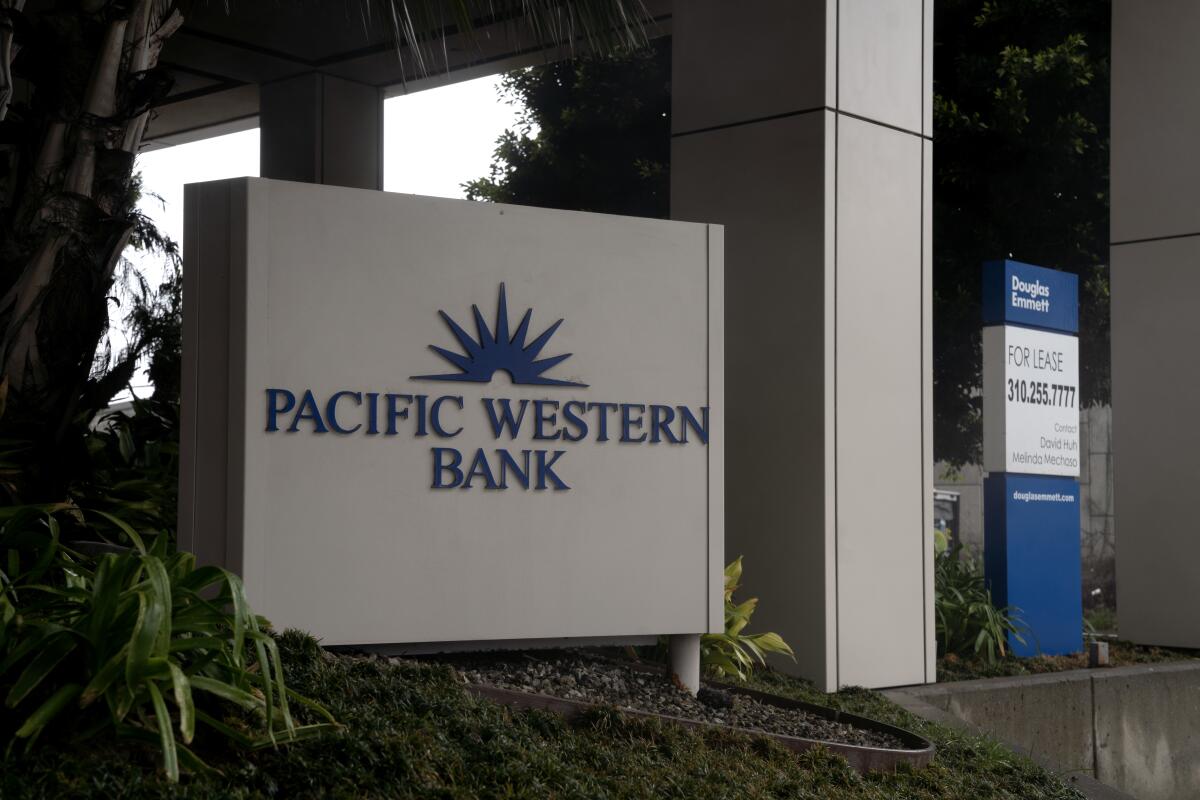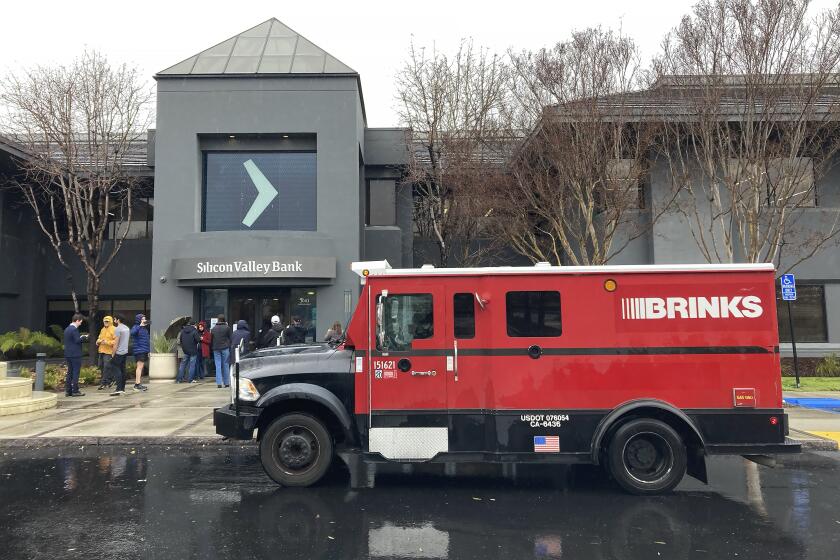PacWest Bancorp secures $1.4-billion lifeline after drain on deposits

- Share via
PacWest Bancorp is moving to shore up liquidity to protect itself after customers pulled 20% of their deposits since the start of the year.
The regional bank, whose shares have tumbled 58% this month, secured a $1.4-billion financing facility from the Apollo Global Management-owned investment firm Atlas SP Partners and abandoned a separate push to raise capital because of market volatility, it said in a statement Wednesday.
PacWest and other regional U.S. banks have been reeling since the collapse of three lenders this month. Rising interest rates have depressed the value of the companies’ fixed-income investments, and a sudden surge in customer withdrawals has forced them to sell assets at a loss.
“In light of the current volatility in the market and depressed market prices for regional bank stocks, as well as the availability of other options to enhance capital, the company determined it would not be prudent to move forward with a transaction at this time,” the Beverly Hills lender said of its attempt to raise capital.
PacWest’s operations include 67 Pacific Western Bank branches in California.
Its stock closed down 17.1%.
Still, there’s indication the global rally in bonds boosted the value of the bank’s securities portfolio, said Keefe, Bruyette & Woods analyst Christopher McGratty.
PacWest has already borrowed $3.7 billion from the Federal Home Loan Bank System, $10.5 billion from the Federal Reserve’s discount window and $2.1 billion from the bank term funding program as of Monday. The bank cited those liquidity-enhancing measures in deciding not to proceed with the separate effort to raise money.
Silicon Valley Bank telegraphed that its securities holdings were underwater. Why didn’t the regulators act sooner?
First Republic, a San Francisco lender known for catering to wealthy tech executives, has lost 87% of its stock market value this year as customers pulled their money. An attempt by 11 stronger banks to shore up the company by depositing $30 billion last week gave First Republic and advisors including JPMorgan Chase more time to find a way to resolve the strains. Wall Street leaders and U.S. officials discussing an intervention at First Republic are exploring the possibility of government backing to encourage a deal.
Deposits ‘stabilized’
At PacWest, about $4.9 billion of the $6.8 billion of this year’s total outflows came from its venture-banking segment, according to the statement. Deposit levels have “stabilized,” it added. The bank had more than $11.4 billion of cash on hand as of Monday, which exceeds total uninsured deposits at the bank of about $9.5 billion.
“Their Treasury staff has done an excellent job stockpiling liquidity so that actual losses on underwater securities need never be experienced,” Todd Baker, a senior fellow at the Richman Center for Business, Law and Public Policy at Columbia University, said in an email. “The use of the Atlas SP facility (which uses longer-term assets as collateral) is quite smart although undoubtedly expensive. This company will be fine in every circumstance but a generalized panic run, in my view.”
Atlas SP is an investment firm led by former Credit Suisse Group executive Jay Kim. It got its start as a stand-alone operation last month after Apollo closed the purchase of the Swiss bank’s securitized-products group. Kim previously was a managing director at the bank and head of securitized products. Apollo is the majority shareholder of Atlas SP.
Financial turmoil has some people wondering if a systemic problem is putting all banks in peril, as in the Great Recession. Experts say that isn’t the case.
“Without a willingness to raise capital at these levels, we would expect the company to continue to shrink the asset base, and these facilities do give management time to reduce assets, where possible, and ‘raise capital’ by shrinking the balance sheet,” RBC Capital Markets analyst Jon G. Arfstrom wrote in a note Wednesday. “At this point, that is what we are likely to see from the company.”
More to Read
Inside the business of entertainment
The Wide Shot brings you news, analysis and insights on everything from streaming wars to production — and what it all means for the future.
You may occasionally receive promotional content from the Los Angeles Times.












